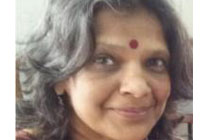Transnational South Asia Series: Abha Sur

Transnational South Asia Series: Abha Sur
Shared histories and structures of caste and gender discrimination are vital not only for analyzing the nature of systemic social oppression, but also for building a coherent resistance to it. Through a collective history of Anna Mani and her two women colleagues Lalitha Chandrasekhar and Sunanda Bai - all of them graduate students in C.V. Raman's laboratory at the Indian Institute of Science, Bangalore in the 1940s, Abha Sur will explore the enabling (and disabling) aspects of culture in the making of women scientists in India in her talk titled "Gender, Science and Catse in India." Abha Sur
Sur is a scientist turned historian of science. She received her Ph.D. in Physical Chemistry from Vanderbilt University and postgraduate training in the field of multi-photon ionization spectroscopy at SUNY, Stony Brook and at Yale University. She has published several articles in chemistry. Her more recent research focuses on the history of modern science in India from a subaltern perspective. In her book Dispersed Radiance: Caste, Gender, and Modern Science in India (New Delhi: Navayana, 2011) she examines the confluence of caste, nationalism, and gender in science and unpacks the colonial context in which science was organized. Abha Sur was a fellow at the Bunting Institute at Harvard University and at the Dibner Institute for the History of Science and Technology at MIT. She is presently a lecturer in the Program in Women's and Gender Studies and a research associate in the program in Science, Technology, and Society at MIT. Physical Chemistry from Vanderbilt University and post-graduate training in the field of multi-photon ionization spectroscopy at SUNY, Stony Brook and at Yale University. She has published several articles in chemistry. Her more recent research focuses on the history of modern science in India from a subaltern perspective. In her book Dispersed Radiance: Caste, Gender, and Modern Science in India (New Delhi: Navayana, 2011) she examines the confluence of caste, nationalism, and gender in science and unpacks the colonial context in which science was organized. Abha Sur was a fellow at the Bunting Institute at Harvard University and at the Dibner Institute for the History of Science and Technology at MIT. She is presently a lecturer in the Program in Women's and Gender Studies and a research associate in the Program in Science, Technology, and Society at MIT.

